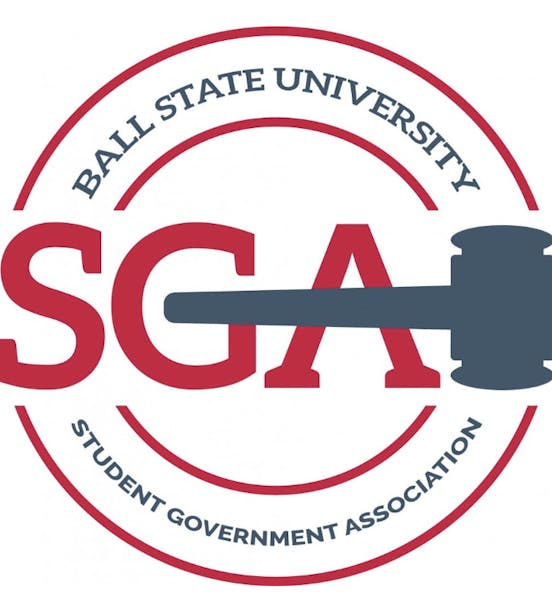Editor's note: To avoid conflicts of interest, Daily News Director of Recruiting Grayson Joslin and Daily News Digital Editor-in-Chief both recused themselves from the analysis of SGA leadership candidates. Joslin served as an SGA senator in the 2021-22 academic year, and Grounds served as spokesman for the Board of Elections in the 2022 election.
Each year, the Daily News awards ratings to outgoing Student Government Association (SGA) officer candidates based on their effectiveness in achieving their goals and their impact on the Ball State University community.
The Gassensmith & Lindstrand Administration, led by former President Joseph Gassensmith and former Vice President Monet Lindstrand, committed to a number of initiatives to increase sustainability, safety and diversity at Ball State during their tenure in the Student Government Association (SGA).
RELATED: Point-by-point rating of Ball State University's Student Government Association
Although their ambitions were high, their administrations revealed large gaps between goals and implementation, mainly due to a lack of research and planning.
The university has made great strides in sustainability, particularly through the continuation of the Student Dining Advisory Committee and strengthening its relationship with dining services. The university has introduced biodegradable products in some dining halls and improved allergy labelling.
However, the goal of replacing the felled trees with two new trees was not fully achieved, instead choosing to plant five new trees bearing SGA plaques.
This adaptation to the original policy platform was a wise one, but it highlights a broader problem: The administration's early promises often exceeded what it could deliver.
Efforts to support diversity, equity, and inclusion (DEI) across campus were mixed: University officials’ “identity button” campaign was well executed, but a proposed student diversity committee fell short.
Instead, DEI responsibilities were handled by Rileigh Lancaster, who was already SGA’s secretary of DEI, an arrangement that indicates a lack of pre-election research into the redundancies of their proposals.

Ball State University Student Government Association (SGA) President candidate Joseph Gassensmith and Vice President candidate Monette Lindstrand talk about SGA's community garden. Gassensmith is the current SGA Chief of Staff and Monette is the current SGA Vice President and has served as a Senator for three years. Abigail Denault, DN
Why are we proposing the creation of a DEI committee when SGA’s DEI Secretary is already fulfilling that role?
The university administration's efforts to raise student awareness about disabilities and sexual assault had limited “success.” Although relevant university departments supported the administration's plans to raise awareness about disabilities, they ultimately failed to gain the approval of the faculty.
Similarly, the sexual assault awareness initiative was only partially realized, as another organization had already completed the Angel Shot initiative, and collaboration with student housing did not materialize as planned.
Instead, they have had to rely on SGA residence hall representatives to make sure students know what resources are available to them through the Victim Assistance Office.
These results highlight an important point: the Administration once again failed to conduct thorough research on existing programs and viable partnerships before making commitments.
The government's safety plan has faced legal and budgetary obstacles, resulting in the introduction of warning signs instead of the previously promised blue lights.
Transportation initiatives such as adding a second blue loop bus route or introducing more scooters were similarly impossible due to budget constraints and liability concerns.
The successful installation of a bus stop shelter near Bracken Library was a positive outcome, but it was simpler than the original, more comprehensive transportation goal.
Their work on student employment and wages was mainly to rename the Fair Pay Commission and conduct an investigation, rather than making any substantive changes.
Research is essential, but it is no substitute for great progress.
Efforts to increase diversity within the Student Senate have had some success in filling seats and engaging the broader student body, but university officials have struggled with long-term student retention issues that have been exacerbated by the COVID-19 pandemic.
Their Benefit Swipes program, aimed at eliminating food insecurity, was too complex to accomplish, so they were forced to pivot. They began supporting existing efforts, such as Cardinal Kitchen, an on-campus food pantry originally run by SGA.
As for the final grade I would give to SGA, I would give it a C-. They came up with some great, very ambitious ideas, but most of them were not feasible and affected the implementation of some of the original policy positions. An administration can come up with as many creative and ambitious ideas as it wants, but if it cannot implement them, what good is it?
The Gassensmith & Lindstrand administration has seriously addressed important issues and devised solutions that, if implemented, would have greatly benefited students. However, its overall success has been marred by a recurring theme of a lack of comprehensive research and realistic planning, resulting in some unfulfilled promises and forcing it to change direction from its original direction.
Future SGA administrations should prioritize thorough research before announcing policy points. Understanding budget constraints, legal restrictions, and existing university initiatives can avoid the need for mid-term adjustments and increase the credibility of SGA leaders.
By setting realistic, well-researched goals, future administrators can ensure that their commitments are ambitious and achievable, ultimately leading to more substantial and lasting improvements for students overall.
For comments, please contact the Daily News at editor@bsudailynews.com


